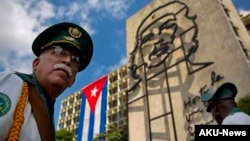South Africa's ruling African National Congress has launched the Cuban Solidarity Campaign - pledging to work against long-standing U.S. sanctions against the communist island nation.
ANC Secretary-General Gwede Mantashe has pledged South Africa to help Cuba fight what he calls the "inhuman" U.S. sanctions against the Caribbean nation.
"We should pay our solidarity to the cause of the Cuban people, reciprocate the solidarity they gave to us, and do that out of love and out of appreciation that we need each other," Mantashe said.
Mantashe's spoke Thursday night in Johannesburg to mark 20 years of diplomatic relations between Cuba and South Africa.
The U.S. embargo in place since 1960, is fairly comprehensive banning all exports - except humanitarian supplies - to the island nation which is just 145 kilometers off the American coast. But the sanctions do not block third-party trade with Cuba.
Successive U.S. presidents have supported the embargo despite the falling away of similar Cold War sanctions on communist nations - notably on China.
What is not clear is why South Africa is launching the Cuban solidarity campaign now - when U.S. sanctions have been in place for more than 50 years - one of the most enduring trade embargoes in modern history.
Gideon Chitanga, a political researcher at the Center for Study of Democracy, specializing in governance and security in Africa, suggests that 20 years after attaining democracy, South Africa feels ready to tackle global issues.
"More and more, South Africa is becoming a confident voice of the global South. So, the timing should be seen in terms of a South Africa which is asserting itself in the context of general global issues, but not to necessarily to say that this approach opposes the West," he said. "It's a policy that is based on calling for more engagement."
As part of that engagement, Mantashe says the ANC will soon push for a parliamentary resolution calling on President Barack Obama to end the sanctions and release the so-called Cuban Five - convicted in a U.S. court of espionage.
Cuba has admitted the five men were in fact intelligence agents - but were spying on the Cuban exile community in Miami, Florida - not the American government.
Mantashe says he is calling on Obama to take a comprehensive political decision on relations with Cuba.
"Ultimately it is the political decision by the president of the United States to release the Cuban Five. It is quite important that we don't only focus on the Cuban Five, you also focus on the lifting of the American blockade," he said. "It has outlived its usefulness but they don't take the decision to lift it."
The United Nations General Assembly has for the past 20 years passed an annual resolution condemning the sanctions as a violation of international law.
Cuba's ambassador to South Africa, Carlos Fernandez de Cossio, says he appreciates South Africa's support and is hopeful it will have an impact.
"South Africa, because of its history, has an impact in the U.S. perhaps greater than other countries," he said. "So any step, any effort, any call, any demand, any pronouncement from South Africa, is for us a very high quality contribution."
Obama has insisted that the Cuban embargo will remain until Cuba transitions to democracy, respects human rights and releases political prisoners.
